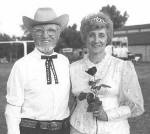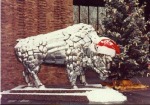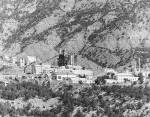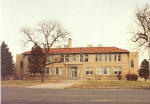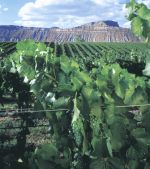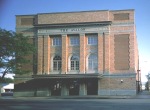

The centennial of
Grand Junction was a community wide celebration in June, 1982. There were
parades, fireworks, concerts, picnics and a pageant in Lincoln Park with
costumed citizen performers. This frisbee was one of the products to
celebrate the centennial.
Also shown are shirts from bicycle and foot races of the decade.
The 1980s
Prospects
looked dynamic in 1980, but the collapse of the oil shale industry in1982
lead to a drastic retrenchment. Nonetheless, Grand Junction celebrated its
centennial with high spirits in 1982. The population had grown to 28,144 in
1980, a 39.5 percent jump from 1970.
